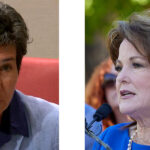Less than 2 days after the start of the trial, a jury in New York has reached a verdict in the criminal case against former President Trump. The verdict is set to be delivered shortly following a six-week trial with 22 witness testimonies. Prosecutors accused Trump of falsifying business records in an attempt to interfere with the 2016 presidential election by misclassifying hush money payments to adult film actress Stephanie Clifford. Trump has denied the charges, calling the trial an act of political persecution. The jury did not have to agree unanimously on the unlawful means identified by prosecutors, and they were instructed on the concept of accessorial liability. The defense argued that key elements of the case hinged on unreliable witness testimony, while the prosecution claimed there was overwhelming evidence of Trump’s guilt. The records in question included payments to Michael Cohen and Stephanie Clifford, with Cohen testifying that he made the payment to Clifford in 2016 with the understanding that Trump would reimburse him. The trial also included testimony from Clifford about an alleged sexual encounter with Trump in 2006.
President Trump approved the payment. He later testified that he was extremely angry when he found out his bonus was reduced by two-thirds from his usual amount that year.
This led to conversations with former Trump Organization CFO Allen Weisselberg, who reportedly devised a plan to reimburse Mr. Cohen $130,000 for the payment to Ms. Clifford and $50,000 for a previous payment to Red Finch, for which he claimed he had not been reimbursed. The total amount was increased to $360,000 to cover taxes, and Mr. Weisselberg added an extra $60,000 to boost Mr. Cohen’s bonus.
Prosecutors alleged that Mr. Weisselberg’s adjustment of the figures for tax purposes indicated an attempt to disguise reimbursement as income.
The $420,000 was then paid to Mr. Cohen through monthly checks in 2017. During the trial, prosecutors aimed to demonstrate that President Trump had instructed false records to be recorded when Mr. Weisselberg, acting as a co-conspirator, instructed his comptroller Jeffrey McConney and bookkeeper Deb Tarasoff to process these payments.
President Trump was not directly accused of conspiracy, and prosecutors were not required to prove the intent or state of mind behind any alleged conspiracy.






